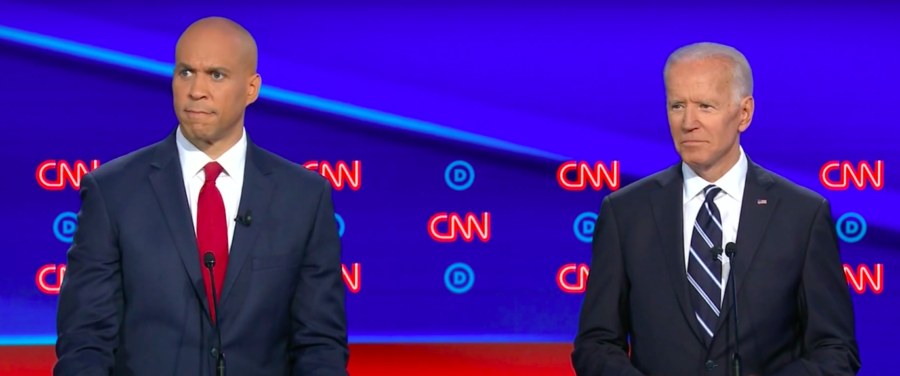Second night of second Democratic debate features few standout moments
second dem debate night 2 2020 biden booker
July 31, 2019
Featuring the most diverse presidential debate stage in American history, the second night of the second Democratic presidential debate Wednesday seems set to have less of an impact than the first debate.
Mack Shelley, Iowa State professor and chair of the political science department, said viewership in the first night of the second debate was “way down” from the debate nights in June.
“My guess is that tonight also will have substantially lower ratings than the second session of the first debates,” Shelley said. “Assuming that will be true, the July debates likely will have less impact.”
There was no major stand-out moment, Taylor Blair, senior in industrial design and president emeritus of the College Democrats, said.
However, Blair said “when [Sen. Cory] Booker went after [former Vice President Joe] Biden on criminal justice [reform]” stood out more than other back-and-forths.
Biden hit Booker for his time as mayor of Newark, saying he hired former Republican New York Mayor Rudy Giuliani’s “guy” to solve crime.
When Booker ran for mayor, he called for a zero-tolerance policy towards crime in a city dealing with corruption and poverty issues. Booker’s predecessor as mayor was convicted of multiple fraud charges, and Booker noted the head of the New Jersey ACLU said as mayor he “put forth national standards setting accountability.”
“Mr. Vice President, there’s a saying in my community: that you’re dipping into the Kool-Aid, and you don’t even know the flavor,” Booker said in response to Biden’s criticism.
“To me, it looks like no one is really starring in this [debate],” Shelley said shortly after this exchange.
Sen. Kamala Harris, who had a heated exchange with Biden in the first debate, debated her health care plans with Biden.
Before the debate began, as candidates were introduced and took to the stage, Biden said “Go easy on me, kid.” Harris served two terms as California attorney general, and is more than halfway through a term in the U.S. Senate.
Harris’s new health care plan calls to switch the United States to a “Medicare for All” system over 10 years.
Biden said Harris’s plan is too expensive, adding “[Harris] has had several plans so far.”
Harris retorted Biden’s statements about her plan were untrue and hit the former vice president’s plan for not insuring 10 million Americans. She said under her plan, everyone would have access to health care.
Among lower polling candidates, many strove to have break out moments to ensure their campaigns could continue into the September debate.
Throughout the debate, businessman Andrew Yang displayed a high-degree of message discipline.
Yang’s campaign focuses on his plan to give all Americans $1,000 each month, which he calls a “freedom dividend.” During his time on the stage Wednesday, Yang related all of his answers in some way to that plan, also known as a universal basic income (UBI).
In answering a question about immigration, Yang said his father was an immigrant and pivoted to say the factories in Michigan are not full of immigrants doing jobs Americans previously did, but robots and machines doing those manufacturing jobs.
Yang said immigrants will be “scapegoated” for the loss of those jobs and a way to mitigate that would be to implement his UBI plan.
Sen. Kirsten Gillibrand has run her campaign noting her appeal to Republican voters, and on her outspoken feminist politics.
Gillibrand said if elected president, her first move would be to “Clorox the Oval Office,” receiving rapturous applause and laughter.
In a nod to her appeal to rural white voters and suburbanites, having won them over in her House and Senate races in New York respectively, Gillibrand said in response to a question on race, she would be able to explain white privilege to those voters.
“I can explain to white women in the suburbs that when their son is walking down the street with a bag of M&Ms in his pocket, wearing a hoodie, his whiteness is what protects him from not being shot,” Gillibrand said.
In their closing statements, most of the candidates asked those watching to go to their campaign websites. All of the candidates’ home pages on their websites have options to donate to their campaigns.
In order to qualify for the September debate, candidates need to receive at least 2% in four Democratic National Committee approved polls and receive at least 130,000 unique donations from at least 400 donors in at least 20 states.







